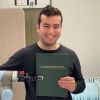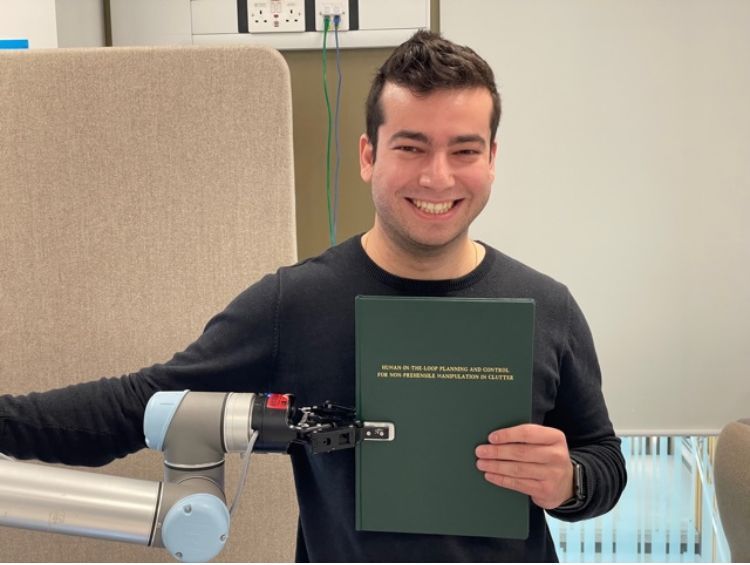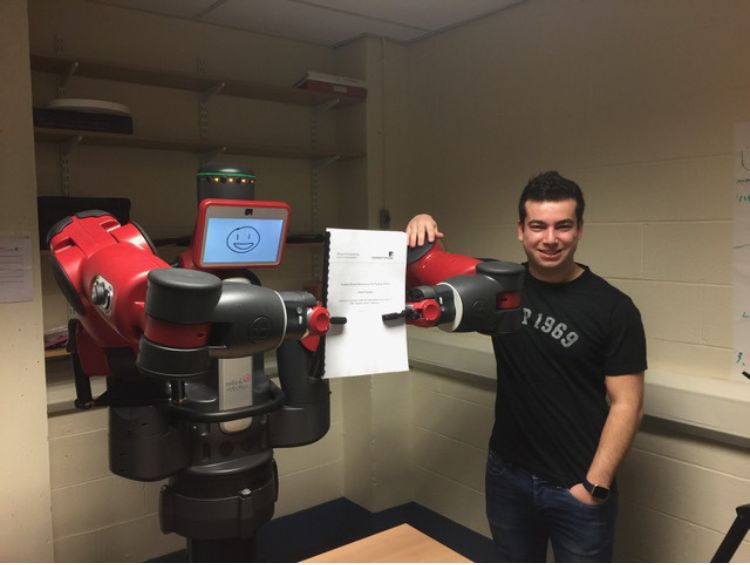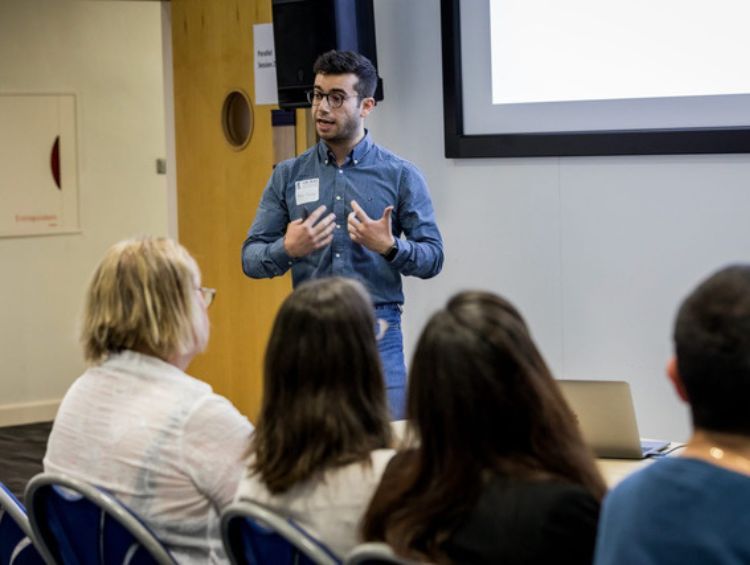
Dr Rafael Papallas
- Course: Computer Science (Industrial) BSc and Computing and Robotics PhD
- Year of graduation: BSc 2017, PhD 2021
- Job title: Research Fellow
- Company: University of Leeds
- LinkedIn: https://www.linkedin.com/in/rpapallas/
Dr Rafael Papallas began his academic journey at the University of Leeds when he moved to the UK in 2013 to pursue a degree in Computer Science (Industrial) BSc. Later, he completed his PhD in AI and Robotics at the School of Computing and has since become a Research Fellow here at the university.
Rafael initially aimed to complete his degree and work as a software engineer in the industry, however after being inspired by the teaching at Leeds he decided to change his career plans. Rafael explained: “a year into my studies, the prospect of an academic career seemed desirable. The quality of teaching and research at Leeds helped me realise this early on.”

Rafael Papallas pictured with the robot he used during his PhD, holding his PhD thesis.
A year into my studies, the prospect of an academic career seemed desirable. The quality of teaching and research at Leeds helped me realise this early on.
Motivated by the academic environment at Leeds, Rafael decided to pursue a PhD. But before fully committing to this career path, he felt it was essential to gain industry experience. In his second year, he looked for placements in the industry and secured a year-long placement as a software developer.
Rafael explained: “I found myself drawn towards pursuing a PhD. However, before fully committing to this career path, I felt it was important to gain some industry experience too. In my second year, I looked for placements in industry, and I secured a placement as a software developer. This year-long experience was invaluable. Working on projects with multinational companies, I built important technical skills and created lasting connections that I maintain to this day.”
Working on projects with multinational companies, I built important technical skills and created lasting connections that I maintain to this day.
Despite receiving an offer for a permanent position at the end of his placement, Rafael remained focused on his goal of pursuing a PhD. After completing his final year project, which focused on robotics, Rafael graduated in 2017 and enrolled in a PhD in Robotics and AI, securing an EPSRC DTP scholarship to support his studies. Since 2021, Rafael has been a Research Fellow in the School of Computing and is currently working on an exciting EPSRC project, developing a next-generation robotic system for warehouse picking and packing. Additionally, he has been co-leading and teaching the Intelligent Systems and Robotics module at the university since 2021.
Tailored study
In third year, Computer Science students complete an individual project which allows them to showcase their accumulated skills and knowledge. Working with a member of academic staff, students have the opportunity to define, refine, and complete a project related to their interests.
Reflecting on his final-year project, Rafael said: “in my third year, I had to select a final year project. A robotics project caught my eye – building an intelligent robot cashier. This was uncharted territory for me, as I had no prior experience in robotics. Nevertheless, I embraced the challenge...My final year project steered me towards robotics and artificial intelligence. This project presented significant challenges, requiring me to invest hours in learning the fundamentals, as I had no prior experience. The hard work and dedication ultimately proved rewarding, as it helped me realise that a career in robotics and AI is exciting and fulfilling. I believe that a good university is one that provides students with opportunities to study different modules and discover their true interests and potential.”
This was uncharted territory for me, as I had no prior experience in robotics. Nevertheless, I embraced the challenge.

Rafael Papallas holding his Final Year Report with the robot he used for his Final Year Project as an undergraduate in 2017.
At Leeds, Rafael was given the opportunity to take part in many exciting projects as part of his course: “From my undergraduate studies, my individual final year project, the ‘robot cashier’, was the most exciting project I undertook, which got me into robotics too. The project involved developing an intelligent robot capable of interacting with customers in a store. Moving on to my PhD, I had the opportunity to work on several exciting projects, mainly in robotic object manipulation, and I had the privilege to publish and present novel work at international conferences.”
Preparing for the future
During his time at Leeds, Rafael also completed a year in industry and took part in the summer internships available at the School of Computing.
“I worked for a year in industry as a software developer and also did a summer internship at the school before starting my placement year. I strongly encourage students to seek placements and internships during their studies. These experiences are invaluable for gaining real-world exposure, developing important soft and technical skills, and creating connections. There's a high chance of receiving a job offer from these companies after graduation as well.”
Advice for future students
Looking back at his time at Leeds Rafael offers prospective Computer Science students some advice:
“One thing I learned during my studies is to get out of my comfort zone whenever I find the chance. I can elaborate on this point with two personal stories.
The first begins in 2016, when I returned to university for my third year after completing my placement year. This year involved choosing optional modules. I found a module that I really liked, and I was planning to enrol. I reached out to fellow students who progressed to the third year (they didn’t do a placement year) to see if they would recommend that module. Despite their warnings about the difficulty of the module I decided to enrol in it, challenging myself with the mindset of, “if I like it, I should do fine”. This module turned out to be the toughest yet most rewarding one I ever took, achieving a near 90% score, surpassing my grades in “easier” modules. The module was so influential that it even made me consider doing a PhD in that space.

Rafael Papallas discussing research from the University of Leeds at the UK-RAS International Robotics Showcase 2023 event in Bristol.
The second story relates to how I got into robotics today. As I explained earlier, in my third year, I had to choose a final year project (FYP). Despite having no background in robotics, I was drawn to a challenging project – developing an intelligent robot cashier. Back then, the FYP was a 60-credit module, which is equal to almost 6 modules today. Not doing well could negatively affect your degree classification. I was tempted to select an “easy” project that I had experience with. However, again, knowing that I liked the robotics project and I wanted to do a PhD in that area potentially, I decided to take up the challenge once more, saying to myself “if I like it, I should do fine”. Despite initial struggles (nearly 3 weeks before the submission deadline, nothing was working) my relentless effort paid off. I managed to implement a solution, get good results and submit a solution on time. This project turned out to be a great choice as not only received the Best Project Award of the year from the school but also paved the way for my PhD in robotics.
These experiences taught me that stepping out of your comfort zone is where real growth and discovery happen. By facing such challenges, you build confidence and resilience, preparing you for future endeavours. Don't shy away from these opportunities – they may lead to unexpected and fulfilling paths in your career and personal development.”
Join us
Want to know more about student life at Leeds? Chat to one of our current students to find out what it’s like to be part of our welcoming community.

